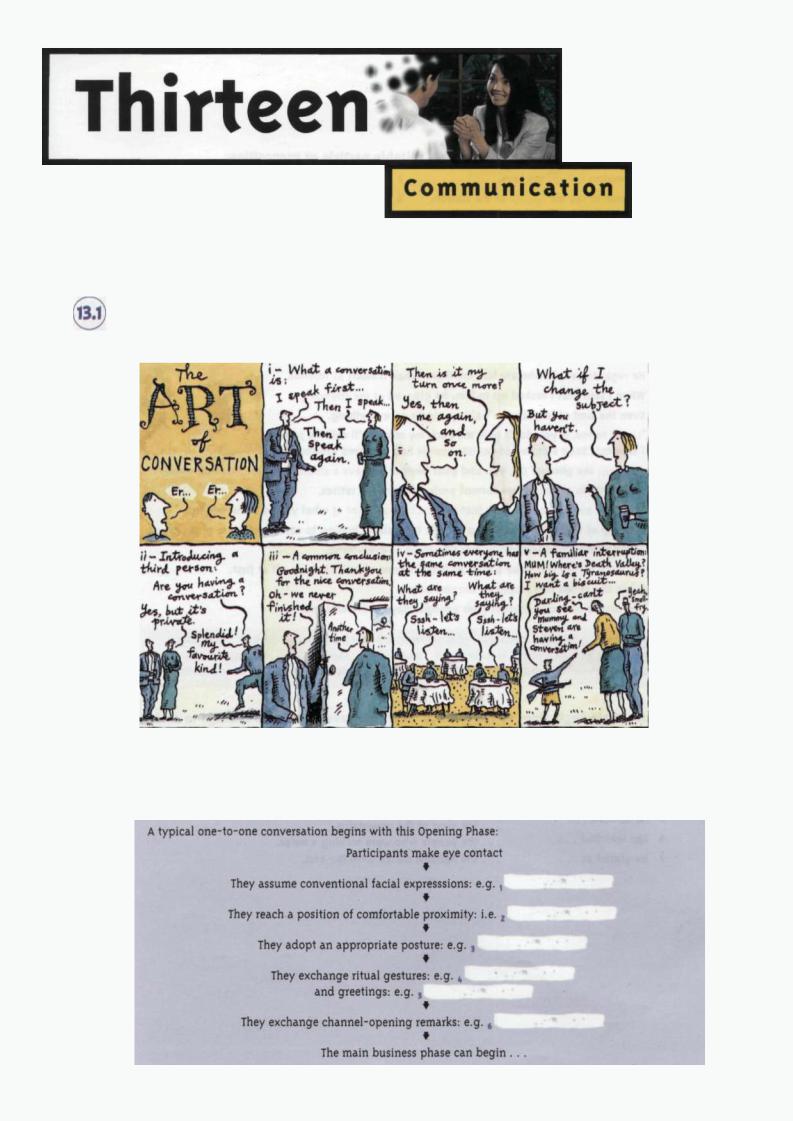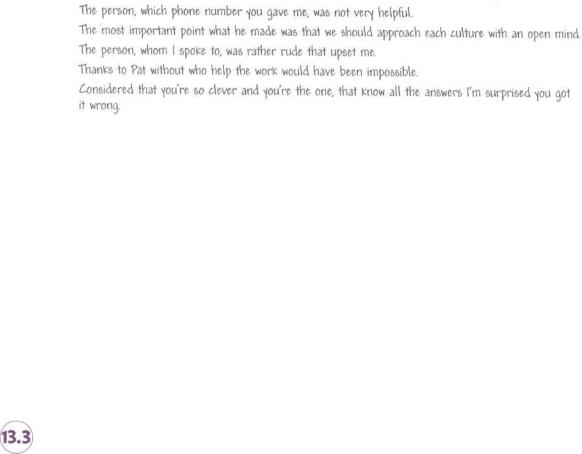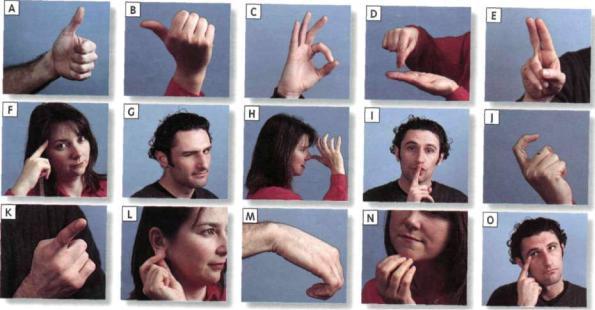
English_books / Adv_eng
.pdf
1Before you listen to the recording, check how much your partner already knows about how a VCR works.
Which of the missing information in the diagrams below can you fill in?
2Listen to the recording and fill each gap in the captions with one word or number.
1Half the pairs should look at Activity 6 (how a MOVIE SOUNDTRACK works), the other half at 25 (how a MOVIE PROJECTOR works).
2Work with a pair who were studying different information and share your knowledge.
Imagine that a friend is coming to stay in your home while you and your family are away for a week. Your friend will need to know how to operate everything. Write instructions for your friend explaining how to operate TWO pieces of equipment in the kitchen and/or the living room (about 250 words).
If instructions are numbered or laid out clearly they're easier to understand. Using headings can help your reader to see at a glance what you're referring to.

New Cambridge Advanced English
Look and see
Verbs and idioms
Fill the gaps in these sentences with a suitable particle or preposition:
1 |
I'm looking |
|
my keys. |
5 |
She looked the word |
in a dictionary. |
2 |
He came to see me |
at the station. |
6 |
The pupils look |
their teacher. |
|
3 |
Look |
! There's a car coming. |
7 |
The police are looking |
the crime. |
|
4 |
We all saw |
|
his lies. |
8 |
If you're leaving I'll see you |
|
Rewrite the sentences, replacing the phrases in red with the expressions below.
1 If you're travelling in the rush hour, beware of pickpockets.
2If you're ever in London, don't forget to call in to see me.
3If we're both at the show, let's watch for each other in the interval.
4They have a lovely room, it has a view of the sea.
5He regards people who are less intelligent than himself as inferior.
6When I said that I looked up to him, he glanced at me strangely.
7Even the best of friends don't always agree on everything.
8'Listen to me, if you don't give me back my money I'll call the police,' I shouted. Soon a crowd of curious people had gathered around us.
9Can I see the photos? Oh, you and your brother do have a similar appearance, don't you? 10 She wants to complete her current project before she retires.
11 You have such a good excuse that I won't take account of what you've done wrong.
12 A group of tourists were waiting outside the palace, hoping to catch a glimpse of the Queen. 13 Leave all the arrangements to me: I'll attend to everything.
14 His story turned out to be a pack of lies but none of us disbelieved it at first. 15 When she called him stupid he became angry.
16 Old people like to remember their younger days with nostalgia.
onlookers overlook overlook give someone a funny look have a look at look alike
look back on |
look here |
look down on look out for look out for look someone up |
see eye to eye |
see red |
see something through see through something see to something sightseers |
Match these beginnings to the endings. There are several possible endings to each beginning.
1 He glanced at. . .
2 She stared at. . .
3 He gazed at. . .
4 She peered at. . .
5 He noticed . . .
6 She watched . . .
7 He glared at. . .
. . . television all evening.
. . . the painting for a long time.
. . . her with admiration.
. . . the person sitting opposite on the bus.
. . . the small print in the brochure.
. . . the view of the mountains.
. . . the people who were making a noise.
. . . the football match until the end.

The art of conversation
Listening and Vocabulary
11 Before you listen to the recording, look at the flowchart below. Can you think of any examples to fill some of the gaps? Look at the cartoon for clues!
2 Listen to the recording and fill each gap with ONE of the examples given by the speaker.

. . . |
• |
• |
; |
• |
• |
• |
. |
• . . . . |
• |
New Cambridge Advanced English
.
Discuss these questions and adapt the flowchart accordingly:
• How does a 'typical conversation' begin and end differently if the participants are, for example: complete strangers very close friends or relations boss and employee
•How is a 'typical conversation' different in your country?
•How is a phone conversation different from a face-to-face conversation?
•How does a 'typical English lesson' begin and how does it end?
Fill the gaps in these paragraphs with suitable words from the list below:
1 |
Words like 'the telly', 'the tube' or 'the box' are |
|
words which are more common in |
|||||
|
|
conversation than in |
writing. Learners are often advised to avoid using |
|||||
|
|
words in a foreign language, in case they sound out-of-date or aren't used |
||||||
|
And they should certainly avoid using |
|
. Every profession has its own |
that is |
||||
|
only used within that trade. |
|
|
|
|
|
|
|
2 |
We can often find out about people's feelings by listening to their |
and watching their |
||||||
|
|
and |
. A person's |
may convey their real feelings better than the |
||||
|
words they speak. If someone says your work is 'brilliant' they may be sincere or they may be being |
|||||||
3 |
'It's a small world' is a(n) |
|
we use when we meet someone in an unexpected place. 'Many |
|||||
|
hands make light work' and 'Too many cooks spoil the broth' are contradictory |
|
||||||
|
appropriately bad language |
bilingual |
body language |
colloquial |
expression |
expression |
||
|
formal |
gestures informal |
intonation |
jargon |
proverbs |
regional |
sarcastic |
saying slang |
|
stress |
swear words tone of voice |
|
|
|
|
|
|
Joining sentences - 2
Effective writing
One way of putting extra information into a single sentence is to use RELATIVE CLAUSES. Decide which of the relative pronouns in red can be replaced with a different one (which instead of that, that instead of who, etc.).
1A dialect is a variety of a language that uses non-standard grammar and vocabulary.
2Everyone speaks English with an accent, which is the way they pronounce the language.
3Tracy, who used to go out with David, has just got engaged to Paul, who is his best friend.
4The office in which he works has fluorescent lighting, which gives him headaches.
5Paul has just got engaged to Tracy, who is the daughter of Claire and Frank, who are the owners of Acme Bookshops Ltd, which has just opened a branch in the new shopping centre, which we went to last weekend with David, who used to go out with Tracy and whose best friend is Paul - which goes to show that it's a small world!
Too many relative clauses in a single long sentence can be confusing for the reader. Rewrite the last example above in shorter sentences.

Another technique for adding extra information is to use PRESENT or PAST PARTICIPLES - look again at 7.4 Rewrite these sentences using -ing forms or past participles.
1Albert Sukoff wrote a long article, which he did without the use of a single full stop.
2The first island which was discovered by Columbus was one of the Bahamas.
3As soon as she realised what had happened she called the police.
4You might rotate your forefinger against your temple, which indicates 'a screw loose'.
5 You might rotate your finger close to your temple, which signals that the brain is going round and round.
C Find the errors in these sentences and correct them:
ОExpand each line of notes into one sentence to make a complete story, using -ing forms, past participles or relative clauses. All these events happened in the PAST.
1 David stays with us - finds out Paul and Tracy's plans
While standing with us, David found out about Paul and Tracy's plans.
Hears about plans - upset and angry
Feels absolutely furious - pushes over table - knocks best glasses to floor While picks up broken glass - cuts finger - starts bleeding
Handkerchief from pocket - wraps round cut
After gathers up broken pieces - pieces on floor - apologises Realises how stupid - offers to replace broken glasses
8Intends buy us new set - knows they are good quality ones - goes to store in town - store has good stock of glassware
9Looks round store - discovers glasses very expensive - gives him quite a shock
10 Since breaking glasses - careful to keep temper!
Gestures
Reading
АRead these two extracts from Manwatching by Desmond Morris. Then note down your answers to questions 1 to 7 opposite.
GESTURES
A gesture is any action that sends a visual signal to an onlooker. To become a gesture, an act has to be seen by someone else and has to communicate some piece of information to them. It can do this either because the gesturer deliberately sets out to send a signal - as when he waves his hand - or it can do it only incidentally - as when he sneezes. The hand-wave is a Primary Gesture, because it has no other existence or function. It is a piece of communication from start to finish. The sneeze, by contrast, is a secondary, or Incidental Gesture. Its primary function is mechanical and is concerned with the sneezer's personal breathing problem. In its secondary role, however, it cannot help but transmit a message to his companions, warning them that he may have caught a cold.
Most people tend to limit their use of the term 'gesture' to the primary form - the hand-wave type - but this misses an
important point. What matters with gesturing is not what signals we think we are sending out, but what signals are being received. The observers of our acts will make no distinction between our intentional Primary Gestures and our unintentional, incidental ones. In some ways, our Incidental Gestures are the more illuminating of the two, if only for the very fact that we do not think of them as gestures, and therefore do not censor and manipulate them so strictly. This is why it is preferable to use the term 'gesture' in its wider meaning as an 'observed action'.
A convenient way to distinguish between Incidental and Primary Gestures is to ask the question: Would I do it if I were completely alone? If the answer is No, then it is a Primary Gesture. We do not wave, wink or point when we are by ourselves; not, that is, unless we have reached the unusual condition of talking animatedly to ourselves.

SYMBOLIC GESTURES
A Symbolic Gesture indicates an abstract quality that has no simple equivalent in the world of objects and movements. How, for instance, would you make a silent sign for stupidity? You might launch into a full-blooded Theatrical Mime of a drooling village idiot. But total idiocy is not a precise way of indicating the momentary stupidity of a healthy adult. Instead, you might tap your forefinger against your temple, but this also lacks accuracy, since you might do precisely the same thing when indicating that someone is brainy. All the tap does is to point to the brain. To make the meaning more clear, you might instead twist your forefinger against your temple, indicating 'a screw loose'. Alternatively, you might rotate your forefinger close to your temple, signalling that the brain is going round and round and is not stable.
Many people would understand these temple-forefinger actions, but others would not. They would have their own local stupidity gestures, which we in our turn would find confusing, such as tapping the elbow of the raised forearm, flapping the hand up and down in front of half-closed eyes, rotating a raised hand, or laying one forefinger flat across the forehead.
New Cambridge Advanced English
The situation is further complicated by the fact that some stupidity signals mean totally different things in different countries. To take one example, in Saudi Arabia stupidity can be signalled by touching the lower eyelid with the tip of the forefinger. But this same action, in various other countries, can mean disbelief, approval, agreement, mistrust, scepticism, alertness, secrecy, craftiness, danger or criminality. The reason for this apparent chaos of meanings is simple enough. By pointing to the eye, the gesturer is doing no more than stress the symbolic importance of the eye as a seeing organ. Beyond that, the action says nothing, so that the message can become either: 'Yes, I see', or 'I can't believe my eyes', or 'Keep a sharp look out', or 'I like what I see', or almost any other seeing signal you care to imagine. In such a case it is essential to know the precise 'seeing' property being represented by the symbolism of the gesture in any particular culture.
So we are faced with two basic problems where Symbolic Gestures are concerned: either one meaning may be signalled by different actions, or several meanings may be signalled by the same action, as we move from culture to culture. The only solution is to approach each culture with an open mind and learn their Symbolic Gestures as one would their vocabulary.
чиаштшшштшшшшт
from Manwatching by Desmond Morris
1What do a sneeze and a wave of the hand have in common?
2What kind of gesture is a yawn?
3What kind of gesture is a raised fist?
4Why is the phrase unusual condition used at the end of the first section?
5How many different signs does the writer describe for stupidity?
6How many different meanings does the writer describe for the gesture of touching the lower eyelid with the tip of the forefinger?
7 How does the writer suggest one should learn the gestures of different cultures?
"© |
Discuss these questions: |
•Can you think of three more examples of incidental gestures - and three primary gestures?
•According to the writer, a sneeze and a yawn are involuntary, incidental gestures. What do these
gestures mean when they are done deliberately:
blinking clearing your throat clenching your fist |
folding your arms grabbing someone's wrist |
licking your hps scratching your head sighing |
sniffing tapping your fingers on a table |
УТТТ 0 Look at these pictures and decide (or guess) what each of the gestures might mean to a British person AND to someone from your own country.

You just don't understand!
Reading
Read the two extracts and decide which writer makes |
|
the following points: John Cray JG , Deborah Tannen |
|
DT- or neither of them N. |
JOHN GRAY |
1 Don't tell someone their motives are bad if they're doing their best.
2Long ago men and women lived in harmony. Men and women are never in full agreement. Men and women will still have arguments.
Communication can improve if you take the blame but not if you blame your partner
6People don't like to be told they are behaving in the wrong way.
7The cause of disharmony between men and women is the way they speak.
8The cause of disharmony is forgetting women and men are different.
9Women and men are constantly disappointed in each other.
10Women and men come from different planets.
11Women and men do speak the same language.
12Women and men should respect their differences.
13Women expect men to become more like women, and vice versa.
Imagine that men are from Mars and women are from Venus. |
Without the awareness that we are supposed to be |
One day long ago the Martians, looking through their |
different, men and women are at odds with each other. We |
telescopes, discovered the Venusians. Just glimpsing the |
usually become angry or frustrated with the opposite sex |
Venusians awakened feelings they had never known. They fell Pecause we have forgotten this important truth. We
in love and quickly invented space travel and flew to Venus. |
expect the opposite sex to be more like ourselves. We |
The Venusians welcomed the Martians with open arms. |
desire them to "want what we want" and "feel the way |
They had intuitively known that this day would come. Their |
we feel". |
hearts opened wide to a love they had never felt Pefore. |
We mistakenly assume that if our partners love us they |
The love Petween the Venusians and Martians was |
will react and behave in certain ways - the ways we react |
magical. They delighted in Peing together, doing things |
and behave when we love someone. This attitude sets us |
together, and sharing together. Though from different |
up to be disappointed again and again and prevents us |
worlds, they reveled in their differences. They spent months |
from taking the necessary time to communicate lovingly |
learning about each other, exploring and appreciating their |
about our differences. |
different needs, preferences, and behavior patterns. For |
Men mistakenly expect women to think, communicate, |
years they lived together in love and harmony. |
and react the way men do; women mistakenly expect |
Then they decided to fly to Earth, in the Peginning |
men to feel, communicate, and respond the way women |
everything was wonderful and beautiful. But the effects of |
do. We have forgotten that men and women are supposed |
Earth's atmosphere took hold, and one morning everyone |
to be different. As a result our relationships are filled with |
woke up with a peculiar kind of amnesia - selective amnesia!unnecessary friction and conflict. |
|
Both the Martians and Venusians forgot that they were |
Clearly recognizing and respecting these differences |
from different planets and were supposed to be different. |
dramatically reduces confusion when dealing with the |
In one morning everything they had learned about their |
opposite sex. When you remember that men are from |
differences was erased from their memory. And since that |
Mars and women are from Venus, everything can be |
day men and women have been in conflict. |
explained. |
from Men Are from Mars Women Are from Venus by John Cray
Many experts tell us we are doing things wrong and should change our behavior - which usually sounds easier than it turns out to be. Sensitivity training judges men by women's standards, trying to get them to talk more like women.
Assertiveness training judges women by men's standards and tries to get them to talk more like men. No doubt, many people can be helped by learning to be more sensitive or more assertive. But few people are helped by being told they are doing everything all wrong. And there may be little wrong with what people are doing, even if they are winding up in arguments. The problem may be that each partner is
operating within a different system, speaking a different genderlect [i.e. a male 'dialect' and a female 'dialect'].
An obvious question is, Can genderlect be taught? Can people change their conversational styles? If they want to, yes, they can - to an extent. But those who ask this question rarely want to change their own styles. Usually, what they have in mind is sending their partners for repair: They'd like to get him or her to change. Changing one's own style is far less appealing, because it is not just how you act but who you feel yourself to be. Therefore a more realistic approach is to learn how to interpret each other's

New Cambridge Advanced English
messages and explain your own in a way your partner can understand and accept.
Understanding genderlects makes it possible to change - to try speaking differently - when you want to. But even if no one changes, understanding genderlect improves relationships. Once people realize that their partners have different conversational styles, they are inclined to accept differences without blaming themselves, their partners, or their relationships. The biggest mistake is believing there is one right way to listen, to talk, to have a conversation - or a relationship. Nothing hurts more than being told your intentions are bad when you know they are good, or being told you are doing something wrong when you know you're just doing it your way.
Not seeing style differences for what they are, people draw conclusions about personality ("you're illogical", "you're insecure", "you're self-centered") or intentions ("you don't listen", "you put me down"). Understanding style
differences for what they are takes the sting out of them. Believing that "you're not interested in me", "you don't care about me as much as I care about you", or "you want to take away my freedom" feels awful. Believing that "you have a different way of showing you're listening" or "showing you care" allows for no-fault negotiation: you can ask for or make adjustments without casting or taking blame.
If you understand gender differences in what I call conversational style, you may not be able to prevent disagreements from arising, but you stand a better chance of preventing them from spiraling out of control. When sincere attempts to communicate end in stalemate, and a beloved partner seems irrational and obstinate, the different languages men and women speak can shake the foundation of our lives. Understanding the other's ways of talking is a giant leap across the communication gap between women and men, and a giant step toward opening lines of com munication.
from You Just Don't Understand by Deborah Tannen
Discuss these questions:
•To what extent do your own experiences mirror the views of the writers?
•Do you believe that males and females are different? Give your reasons.
•How important do you think communication is in a relationship?
•Is it easier for a man to communicate with men, and a woman with women? Why (not)?
Advertising
Listening and Creative writing
You'll hear an interview with Bob Stanners, who works for Leo Burnett - one of the world's leading advertising agencies. Complete each sentence with a word or short phrase.
An art director is responsible for |
1 |
. A copywriter is responsible for |
^Д |
||||
The two people function as a 3 |
|
|
|
|
|
|
|
|
|
|
|
|
|
|
|
It's easier to write 15 minutes of dialogue than 4 |
|
|
|
|
|
||
Every advertisement has to appeal to 5 |
|
|
|
|
|
||
Clients often want to aim too 6 |
|
|
|
|
|
|
|
One shouldn't underestimate the consumer's 7 |
|
|
|
|
|
||
Twenty years ago, in Britain, bottled mineral water was an 8 |
|
|
|||||
He got the idea for a McDonald's commercial from his son, who is a 9 |
|
|
|||||
10 All these qualities are important for a copywriter - but tick only the things Bob mentions: |
|||||||
adaptability |
communication |
childlike faith |
listening to others |
resilience |
|||
ambition |
common touch |
a sense of proportion |
optimism |
sense of humour |
|||
analytical brain |
enjoy selling |
honesty |
|
|
realism |
working in a team |
|

Discuss these questions:
•How much attention do you pay to . . .
TV commercials? radio commercials? posters? ads in magazines?
•Think of a particular advertisement you like - what do you like about it?
•Think of one you hate - why don't you like it?
•What do you think are the differences between British advertisements and advertisements in your country?
1Look at this advertisement from a magazine for computer buffs and discuss these questions:
•Does it make you see red? Why/Why not?
•What are your reactions to political advertising (propaganda) like this?
•Is it suitable for the readers of such a magazine?
America is hooked on foreign oil. Today we import almost 40 per cent of the oil we use - even more than in 1973, when the Arab embargo plunged us into gas lines, rationing, and recession.
The more we can use nuclear energy, instead of imported oil, to generate electricity, the less we have to depend on foreign nations.
The 110 nuclear plants in the US have cut our foreign oil
dependence by over three billion barrels since 1973. And they have cut foreign oil payments by over one hundred billion dollars.
But 110 nuclear plants will not be enough to meet our growing electricity demand. More plants are needed.
To help kick the foreign oil habit, we need to rely more on our own energy sources, like nuclear energy.
For a free booklet on nuclear energy write to the US Council for Energy Awareness, P.O. Box 66103, Dept. SN01, Washington, D.C. 20035.
US COUNCIL FOR ENERGY AWARENESS
Nuclear energy means more energy independence.
Find a copy of a magazine that you enjoy reading. Imagine that the editor has asked you for a report on how suitable the advertisements are for a typical reader, like yourself.
Write a report describing the ads in the magazine. Recommend what kinds of ads the editor should encourage - and what kinds of ads he or she should try to discourage.
Before you start writing, make notes and decide:
-how you will begin (your opening paragraph)
-what your main points will be
-how you will end (your conclusions or recommendations)
Show your work to a partner and ask for feedback.
A report is usually a fairly objective account plus your personal recommendations or conclusions. The purpose of a report is to give your readers information as well as giving them your views. A report can end with a paragraph headed 'Conclusions' or 'Recommendations'.

New Cambridge Advanced English
COLOURS
Idioms and collocations
Each of these sentences contains a colourful expression. What do they mean? Don't use a dictionary - the context will help you to guess.
1Everyone in the class passed the exam with flying colours.
2She didn't go to work because she was feeling a little off colour.
3The detailed descriptions in the story gave local colour to the book.
4Far more men are colour-blind than women.
5All the documents in this office are colour-coded.
6What do you think of the colour scheme in this room?
7Don't allow your personal interest to colour your judgement.
8It was only when he had won the match and started jeering
at his opponent that we saw him in his true colours.
Replace each word or phrase in grey with one of the idioms below:
1 Most manual workers receive wages and are paid weekly.
2He phoned me completely unexpectedly to tell me he was back in town.
3She's very famous so we must give her VIP treatment.
4How environmentally friendly are you?
5They were very jealous when they saw my new Porsche.
6He became very angry when I told him he had made a mistake.
7Dealings with government offices usually involve bureaucratic delays.
8I'm ready to start when you tell me to go ahead.
9Our new clerk makes a lot of mistakes because he's still inexperienced. 10 A lucky coincidence like this happens very rarely.
11 I can't afford to buy anything because I'm still in debt after my holiday 12 The police caught him in the act of committing the crime.
in the red red-handed see red |
red carpet red tape |
once in a blue moon out of the blue blue-collar |
|
green green green with envy |
give the green light |
Fill the gaps in these sentences with one of the idioms below:
1 He showed his disapproval by giving me a
2Send me a letter about this - I need to have all the details
3During the war, some things could only be bought on the
4 |
It's a hilarious |
about an unsuccessful murderer. |
5 He must have been in a fight - he's got a |
||
6 |
They're not getting married in a registry office: they're having a |
|
7 |
I told a |
because I didn't want her to get into trouble. |
8 |
Most |
workers receive a salary and are paid monthly. |
9 |
She had a |
and didn't regain consciousness for several minutes. |
10 |
No one will visit the new museum - it'll be a |
|
|
black comedy |
black eye black look black market blackout in black and white |
